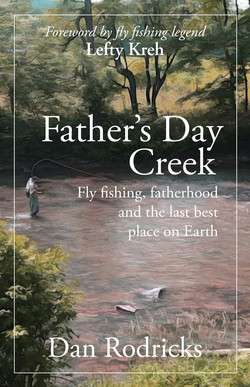Читать книгу Father's Day Creek - Dan Rodricks - Страница 6
На сайте Литреса книга снята с продажи.
ОглавлениеIntroduction
Where would you want to spend your final hours? How would you want to remember life on Earth? Maybe you’d want to be at home in bed, or perhaps in a beautiful temple or stained-glass cathedral, maybe in a library or museum surrounded by great works, perhaps in a favorite place from childhood. I would want to leave by way of Father’s Day Creek. It’s a freestone river that runs through a verdant gorge in Pennsylvania, sheltered by hemlocks, and it seems remote and pristine, though it is neither. For me, Father’s Day Creek has become what Chief Joseph of the Nez Perce called a “spirit-home” and, because of my faith in its resilient beauty, I consider it The Last Best Place on Earth. I hope this book gets you to think about your own “spirit-home,” or Last Best Place, or maybe it will convince you to go out to the woods to claim one before it’s too late. I recommend that everyone take emotional possession of a place, away from the rush of modern life, where you can feel at home and at peace – a place that deepens your love of the natural world, makes you happy to be alive and downright militant about saving our messed-up planet.
I found my little bit of paradise through fly fishing, and a lot of this book is about that form of angling, how and why I came to it and passed my passion on to my son. The book meanders like the creek of its title – an alias I gave the place years ago – and along the way I share some experiences and observations about nature, about friends and family, about being a son and becoming a father, all tied in some way to fishing.
In his poem, “The Pasture,” Robert Frost invites us to join him as he heads out for farm chores. “I sha’n’t be gone long,” he says. “You come too.” And the hope, same as here, is that you’ll find something new and feel refreshed.
I do not pretend to be an expert at fly fishing or parenthood, but if you’re thinking about getting into one or the other, or both, you might pick up a few pointers. If you’ve been there and done that already, then I offer this book as a way of comparing notes on fishing and fatherhood.
The story-within-the-story is about the three hours of Father’s Day morning – Sunday, June 18, 2000 – when I fished the creek, by myself, reached a milestone and had an epiphany about fishing and its larger meanings. I give an accounting of that adventure with time-stamped installments that describe my fishing rituals and my relationship with the creek and its surroundings. In the years when I fished Father’s Day regularly, and usually alone, I kept a journal, but not an hour-by-hour one. So I’ve done my best to recreate what I did that memorable morning and what happened on my last cast before breakfast.
Because I am a journalist and consider myself a conservationist, part of the book reports what I’ve learned about efforts to restore Eastern trout streams to their historic best. Father’s Day Creek is one such place, an environmental success story, having recovered as a healthy wild trout habitat after years of indiscriminate overfishing by anglers who waded into it looking for supper.
Some parts of the essays in this book, including one on the late Mike Flanagan of the Baltimore Orioles, first appeared in The Baltimore Sun, where I’ve been a news columnist since 1979. The shared 5th-floor newsroom of The Sun and Evening Sun, then on Calvert Street in downtown Baltimore, is where I first met Bernard “Lefty” Kreh. He was the morning Sun’s outdoors editor and already a globe-trotting fly fishing legend – a casting instructor to presidents and movie stars – though I had no awareness of that until, more than a decade later, I opened up a spring catalogue to find a photo of Lefty endorsing a fly rod. I kept in touch with Lefty over the years, after he left The Sun, and at one point he gave me and my son, Nick, a casting lesson that was as hilarious and as bewildering as it was instructive and helpful.
In the summer of 2017, when Lefty was 92, I asked him to consider writing the foreword for this book. He agreed. But within a few months, he had become ill and weak and, in both an email and phone call, Lefty apologized for not being able to complete the foreword. Fortunately, by the following January, he was on the phone again, and feeling better. He invited me to his house and offered to dictate his contribution. I sat in his living room with my laptop computer and typed along as Lefty, breathing with the help of an oxygen tank, told stories of fishing, fatherhood and his “spirit-home” on the Potomac River. He approved the final draft of the foreword just a few weeks before he died after a long and beautiful life.
– December 2018
